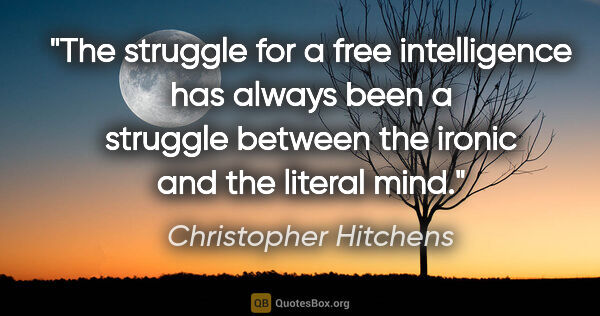Intelligence Quotes (page 26)
White Fang was glad to acknowledge his lordship, but it was lordship based upon superior intelligence and brute strength...There were deeps in his nature which had never been sounded. A kind word, a caressing touch of the hand, on the part of Gray Beaver, might have sounded these deeps; but Gray Beaver did not caress nor speak kind words. It was not his way.
Jack London
He became quicker of movement than the other dogs, swifter of foot, craftier, deadlier, more lithe, more lean with ironlike muscle and sinew, more enduring, more cruel more ferocious, and more intelligent. He had to become all these things, else he would not have held his own nor survived the hostile environment in which he found himself.
Jack London
It was not only that I could not become spiteful, I did not know how to become anything; neither spiteful nor kind, neither a rascal nor an honest man, neither a hero nor an insect. Now, I am living out my life in my corner, taunting myself with the spiteful and useless consolation that an intelligent man cannot become anything seriously, and it is only the fool who becomes anything.
Fyodor Dostoevsky
I used to think she was quite intelligent , in my stupidity. The reason I did was because she knew quite a lot about the theater and plays and literature and all that stuff. If somebody knows quite a lot about all those things, it takes you quite a while to find out whether they're really stupid or not.
J. D. Salinger
Once or twice every night, serving dinner at the big round table, Enid glanced over her shoulder and caught him looking, and made him blush. Al was Kansan. After two months he found courage to take her skating. They drank cocoa and he told her that human beings were born to suffer. He took her to a steel-company Christmas party and told her that the intelligent were doomed to be tormented by the stupid. He was a good dancer and a good earner, however, and she kissed him in the elevator. ...
Jonathan Franzen

The essential act of war is destruction, not necessarily of human lives, but of the products of human labour. War is a way of shattering to pieces, or pouring into the stratosphere, or sinking in the depths of the sea, materials which might otherwise be used to make the masses too comfortable, and hence, in the long run, too intelligent.
George Orwell
The denier that ID [intelligent design] is science faces the following dilemma. Either he admits that the intervention of such a designer is possible, or he does not. If he does not, he must explain why that belief is more scientific than the belief that a designer is possible. If on the other hand he believes that a designer is possible, then he can argue that the evidence is overwhelmingly against the actions of such a designer, but he cannot say that someone who offers evidence on the...
Thomas Nagel
The student is half afraid to meet one of the great philosophers face to face. He feels himself inadequate and thinks he will not understand him. But if he only knew, the great man, just because of his greatness, is much more intelligible than his modern commentator. The simplest student will be able to understand, if not all, yet a very great deal of what Plato said; but hardly anyone can understand some modern books on Platonism.
C. S. Lewis
Conversation! Supple sentences, with first and second meanings and overtones beyond, outrageous challenges with cleverly planned slip-points, rebuttals of elegant brevity; deceptions and guiles, patient explanations of the obvious, fleeting allusions to the unthinkable. As a preliminary, the conversationalist must gauge the mood, the intelligence and the verbal facility of the company. To this end, a few words of pedantic exposition often prove invaluable.
Jack Vance
The reason why I consider myself a clever man is simply because I could never in my life finish anything I'd started. All right, I am a talker, a harmless, boring talker as we all are. But what can I do if the direct and sole purpose of every intelligent man is to talk, that is to say, to waste his time deliberately?
Fyodor Dostoevsky